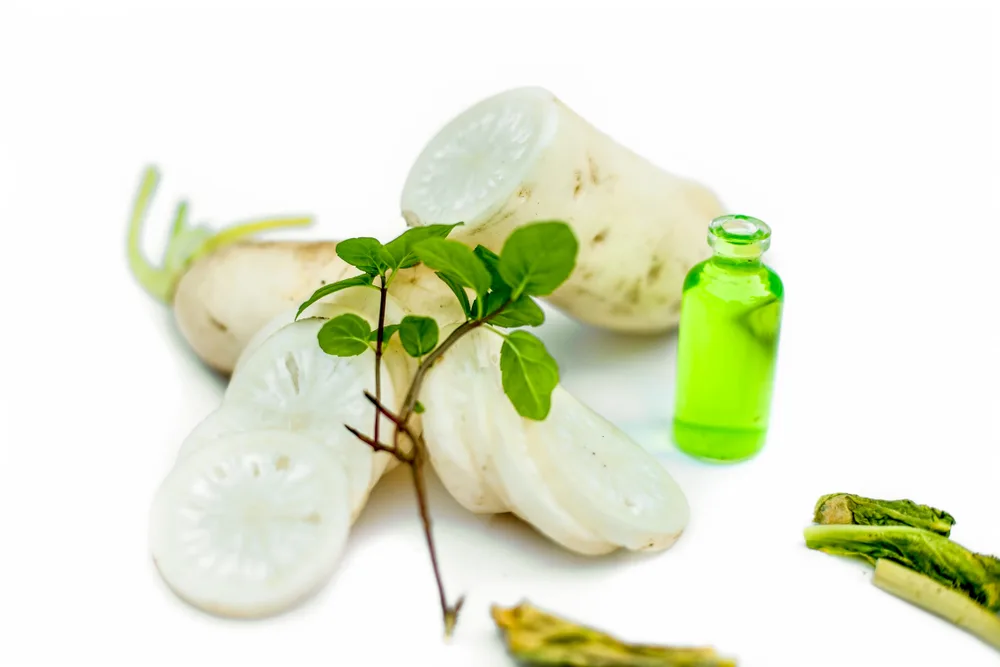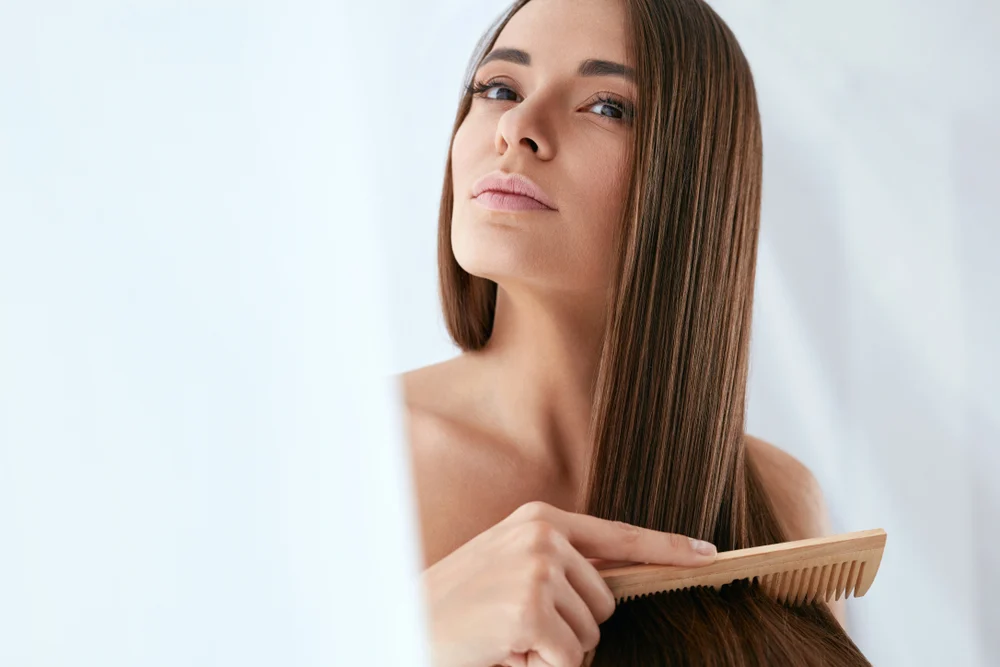Jump to:
Dimethicone, also known as polydimethylsiloxane, is one of the most commonly used silicone organic polymers because of its wide array of uses.
It’s widely used in many shampoos and conditioners, but whether it’s beneficial or harmful to hair is still debated. We’ll show you why (and our opinion on it) below.
What Is Dimethicone?
Dimethicone is a silicone polymer used in a variety of cosmetic products. In hair, it is used to create smoother hair, reduce frizziness, and protect hair from damage. It is non-toxic and is one of the most commonly-used silicones for cosmetics on the market.
Is Dimethicone Dangerous?
Whether dimethicone is dangerous is a separate question from whether it will damage your hair. While many products are tested and safe for your health, they can still do more harm than good for your appearance.
Experts often consider dimethicone to be safe. It isn’t absorbed through the skin and has little to no effect on your body. We could fine no research suggesting dimethicone is dangerous for your overall health.
What Does Dimethicone Do to Hair?
Like other silicone polymers, dimethicone coats the hair cuticle to make it feel smooth and silky. This coating of the hair has a few benefits in your hair’s appearance and feel and a few potential drawbacks.
Pros of Dimethicone
Dimethicone has a few key benefits, including:
- Reduces frizziness: Dimethicone coats hair cuticles, weighing down flyaways and creating smoother hair overall.
- Creates a water barrier: Products that create barriers like dimethicone are complicated. The barrier can provide hair protection but can also weigh it down, which is an issue if you’re trying to maximize your curls.
- Perfects your hair texture: When dimethicone coats your hair, it fills in gaps and breaks. Filling gaps makes hair smoother and silkier and also reduces the appearance of breakage and dead ends.
Cons of Dimethicone
Like other silicone products, dimethicone coats individual hairs. This creates a water barrier that keeps most water from entering or exiting the strand. By minimizing the absorption of water, long-term use of dimethicone can dry your hair out.
While dimethicone is great for reducing frizziness, that same trait can make your hair fall flat and lose volume. People who want to retain their natural curls may want to avoid dimethicone to avoid lifeless, weighed-down hair.
The Verdict
Dimethicone is not dangerous or harmful to your body and can be good or bad for your hair, depending on your hair’s texture and the results you want to achieve. In general, those looking to create more volume or protect curls could avoid silicone products.
After all, they can create too much weight and reduce the spring of your hair. However, those who want to smooth their hair or reduce frizz will likely benefit from products containing dimethicone.
Read Next: Are Silicones Bad for Your Hair?
What Products Contain Dimethicone?
Dimethicone appears in many products, not just in shampoo and conditioner. Its ability to create a barrier makes it perfect for many different products, including:
- Makeup: Dimethicone can reduce the appearance of wrinkles and skin texture when it coats the skin. It is often found in blurring balms and foundations for this reason.
- Other hair products: Dimethicone is found in hairstyling products and hair masks for the same reasons that it appears in shampoos and conditioners. It can improve texture, reduce frizziness, and protect hair cuticles.
- Moisturizers: When dimethicone creates its protective barrier, it locks in moisture and keeps skin hydrated.
- Topical Creams: Dimethicone is used in skincare products to reduce itchiness or repair dry, rough skin.
Is Dimethicone Bad for the Environment?
While recent growing concerns about the effects of silicone on health are largely unwarranted, the environmental impacts of silicones are dangerous. Silicones like dimethicone don’t degrade for hundreds of years, leaving them to build up in our water systems and the animals that live in them.
Fortunately, any concerns about toxicity for silicone products are usually about low molecular weight silicones. Because dimethicone has a high molecular weight, it cannot easily be absorbed into the body as other silicones can.
While silicones like dimethicone are non-toxic, the full effects of their accumulation in the environment are not understood. As silicones are relatively new products- dimethicone was first used in cosmetics in the 1950s– we likely won’t know the generational effects for many years to come.
Alternatives to Dimethicone

Mirzamlk/Shutterstock
If you’re concerned about dimethicone’s potential environmental effects or are allergic to silicone products, various alternative products can produce similar results.
Bamboo Bioferment
Bamboo bioferment was created as an alternative to silicone products. It can be used in shampoo, conditioner, serums, and hairspray. Silica appears naturally in bamboo, so it is a far more sustainable alternative than mining base materials for silicone.
Coco Caprylate
Coco caprylate is a mixture of coconut alcohol, caprylic acid, and capric acid. It is light and absorbent, so it won’t coat hair the way dimethicone does but will provide hydration and a smooth texture.
Daikon Seed Extract
Daikons are a type of radish popular in many Asian countries. Many cosmetic companies have recently adopted daikon seed extracts (DSEs) as alternatives to silicones because they are renewable, natural, and sustainable.
Daikon seed extract does best as an alternative to highly viscous silicons like dimethicone. Daikon seed extract can add strength and shine to your hair. It has been shown to reduce breakage and produce shine more than alternative natural oils as well.
C13-15 Alkane
C13-15, also known as hemisqualane, can soften and protect hair the same way dimethicone can but is also less heavy, making it a good alternative for those with curls they want to save.
Identifying Silicone and Dimethicone in Products
Products that contain dimethicone will have dimethicone or polydimethylsiloxane (PDMS) in the ingredients list. You can generally identify silicones by looking for the suffixes -cone, -conol, or -silane. Additionally, any words containing siloxane are indicative of silicone-containing compounds.
Most products that don’t contain silicone will have a silicone-free claim on the front. If you’re unsure about the presence of silicones in a product, choose a product with a label instead.
Frequently Asked Questions

puhhha/Shutterstock
Does dimethicone ruin your hair?
No, dimethicone will not ruin your hair. If you’re unhappy with the results of a dimethicone-containing product, a clarifying shampoo will remove the product completely.
Does dimethicone cause frizzy hair?
No, dimethicone will do the opposite- it will coat your hair, cover damage, and reduce frizziness.
Should I avoid dimethicone?
If you want to add volume to your hair and maintain your natural curls, you should avoid dimethicone and other silicones.
Is dimethicone bad for curly hair?
Dimethicone can weigh down hair, decreasing the amount of curliness. You should avoid dimethicone and other silicone products to maintain your natural curls. However, dimethicone will benefit your hair if you’re having a problem with too much volume.
Does dimethicone wash out of hair?
Dimethicone can build up in your hair over time and won’t wash out with regular shampoo- especially if that shampoo contains dimethicone. However, it will wash out with a clarifying shampoo.
So, Is Dimethicone Bad for Hair?
Dimethicone is a synthetic silicone compound used in many cosmetic products, including hair care products. It is used to make hair shiny and protect it from future damage.
While it is not harmful to hair, it may not be the best choice if you want to add volume or are looking for a green haircare solution.
That said, the easiest way to find hair products for your specific type of hair is to take our “hair product recommendation” quiz. Just answer a few questions and we’ll show you what hair products you should use. It’s as simple as that!
